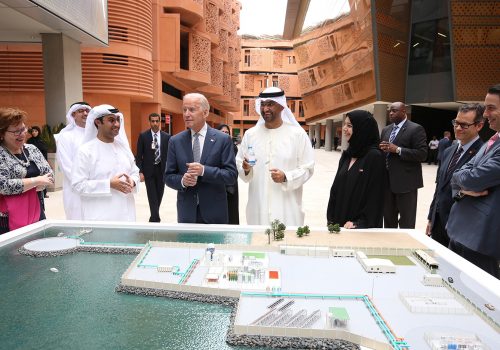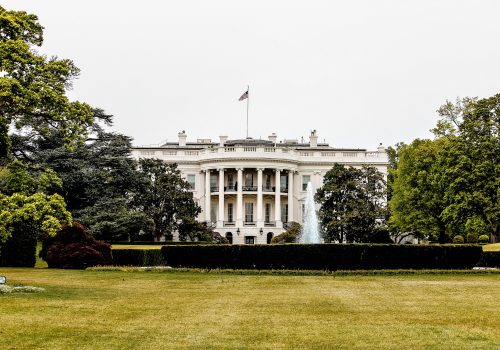“Real friends say the bitter truth,” said Fatih Birol, the executive director of the International Energy Agency. And “the bitter truth is that real energy transitions are coming, and they are coming fast.”
“I believe no country, no oil- or gas-producing government, no companies, nobody will be unaffected by clean-energy transitions,” Birol noted. He was speaking at the Atlantic Council’s 2021 Global Energy Forum as part of the release of the Global Energy Agenda, a new publication by the Global Energy Center that surveys thought leaders on the key trends and issues in the energy sector over the next year.
Mary Nichols, the former chair of the California Air Resources Board, agreed that the transition to renewable energy is about to “accelerate,” and that US leadership on climate change is poised to ramp up in the next year too: “Every part of the government [will be] run by people who are putting [climate change] at the top of their agendas. So, I think we’re going to see rapid action.”
Birol and Nichols were joined by Daniel Yergin, the vice chairman of IHS Markit, who warned that “once you get energy security, you kind of take it for granted and forget about it until you don’t have it again.”
Mohammad Sanusi Barkindo, the secretary general of the Organization of the Petroleum Exporting Countries (OPEC), also pinpointed energy security, reflecting that after “coming out from 2020, with all that we saw… we have to be very, very cautious” about coordinating oil policies Instead, his organization will be focusing on ensuring that “we assist the market… to retain energy stability on a sustainable basis.”
Dharmendra Pradhan, the Indian minister for petroleum, natural gas, and steel stated that India is “looking towards more alternative energy sources” to bolster the country’s energy security but added that oil and gas still play crucial roles in the emerging economy.
Here’s a quick look at some of the highlights from the session, touching on everything from the impact of the pandemic on the energy sector to what to expect from the incoming Biden administration
The pandemic has already dealt its major blows, but they’ll endure
- COVID-19 will leave scars: Birol noted that “COVID-19 had a major, unprecedented impact on energy.” In 2020, “global energy demand declined about five percent,” which “is very big” and “seven times deeper than the decline that hit after the financial crisis,” with oil taking the biggest hit. “We [saw], for the first time, negative oil prices,” he said, and “many of the producing countries [now] face additional challenges because of the lower demand and lower oil prices.” The “scars the COVID-19 pandemic left will be with the energy industry for many years to come,” he predicted.
- Rebound isn’t guaranteed: Now “we are seeing the rebound of oil demand,” Birol allowed, but “it is too early to say when we will come to the levels of 2019.” He pointed to China as an indicator for growth: “China is the first country where we see an economic rebound, the pandemic under control, and today Chinese oil demand is higher than the numbers we had last year and even close to 2019 levels.” But recovery will be more complicated, he added. “We think that oil demand, even in the absence of major policy changes in governments, will not grow as much as we have seen in the past. We rather expect [that for] around five or six years of time after the crisis, oil demand [will be] rather flat.” That means governments need to urgently focus on the “diversification of their economies.”
- Stability for oil producers and consumers: Pradhan added that India, a net importer of energy, is working on improving its energy security by “continuing to use all sorts of energy” and embracing alternative energies like solar and blends of hydrogen and compressed natural gas. Pradhan addressed Barkindo directly and stated that OPEC’s oil-production policies to address the pandemic-fueled drop in oil demand and oil prices, including cutting oil production for a longer time than expected, are creating confusion for India. Barkindo responded that the “historic decision” to reduce supply by 9.7 million barrels a day until April 2022 “was taken as a holistic response to this unprecedented meltdown” and that OPEC “decided to take that number, but again, agreed to be flexible, to be adaptable, as the market recovery took place.” Barkindo told Pradhan that whatever decision OPEC makes next, “we have the interests of our consuming countries in mind. This stability is not only for us, Mr. Pradhan; It is for you as well.”
Watch the full event
Big things are happening in the energy transition
- A new king on the throne: According to Birol, the pandemic left one part of the energy sector unscathed: renewables, which increased “in terms of absolute values in the year 2020, both solar and wind, as a result of government policies and as a result of being very cheap.” Among renewable energies, solar power performed particularly well, and “we can now crown solar as the new king of global electricity markets because last year, half of the power plants installed in the world were solar. The other half [included] everything else put together.”
- Without policy, the gains are only temporary: Birol noted that greenhouse-gas emissions “last year also declined substantially—about 7 percent,” but he doesn’t chalk that up to a dramatic increase in renewable energy: “This decline of emissions that everybody wants to see in the world, for us, that wasn’t a result of policy changes: It was mainly because of the economic downturn and pandemic. If you want to see a structural decline, new policies are needed. And going back to the China example, as we speak now, Chinese emissions are rebounding, and they are significantly higher than the year 2019.”
What the Biden administration means for the energy sector
- A complete 180: According to Nichols, with the incoming Biden’s administration in the United States, “we will now be switching gears dramatically, 180 degrees in terms of government policy” on climate change relative to the Trump administration. “Strong action is absolutely needed if we’re to have hope of meeting the 2050 [net-zero emissions] deadline that was set in the past,” Nichols said, “and I believe that President-elect Biden is going to make it happen.”
- But not the end of oil and gas: While “we’re on a path that is going to accelerate in terms of renewables,” Nichols reflected, she wonders how quickly that will “lead to the disappearance of oil and gas. I don’t think President Biden is suddenly going to put a stop to oil and gas development. That’s just not possible in terms of his commitments to maintaining and growing jobs. But more importantly, I think it would be extremely divisive and difficult to do… We’re going to need to continue to have all these fuels.” For Nichols, “it isn’t so much a question of do we get rid of liquid fuels and do we replace [them] with batteries and hydrogen, as it is how do we make those fuels as clean as possible.” Yergin pointed out that Biden has also insisted that he’s not going to ban fracking. “I think there’s a recognition this is a very important sector of the economy. Jobs are important, and he’s a foreign-policy guy, and it’s important for the position of the United States,” Yergin reasoned. “But there’s no question they’re going to go all out on climate.”
- A pivotal year for the US and the world: Birol said that he is hoping to see the United States assume a leadership role in fostering better international cooperation to address climate change “in a fair and just way among the countries around the world.” 2021 will be “a pivotal year for the energy sector and the fight against climate change” as countries continue to make commitments for net-zero emissions by 2050, he noted. “And this will have huge implications for the energy sector. In fact, the climate challenge is essentially an energy challenge because more than 80 percent of the emissions causing climate change comes from the climate sector. Those pledges and the policies governments will put in place to reach their targets and reach their commitments will have substantial implications for global energy markets.”
- Fighting climate change is in everyone’s interest: Birol believes that countries should feel that “to fight against climate change, to be on the right side [of the effort], is not only an issue of reputation, is not only a moral obligation, but I believe if you don’t do so, it is a major economic or commercial risk for oil producers around the world.”
Katherine Walla is assistant director of editorial at the Atlantic Council.
Further reading
Image: Fatih Birol, Executive Director of the International Energy Agency, speaks at Equinor's Autumn conference in Oslo, Norway. Ole Berg-Rusten/NTB Scanpix/via REUTERS



